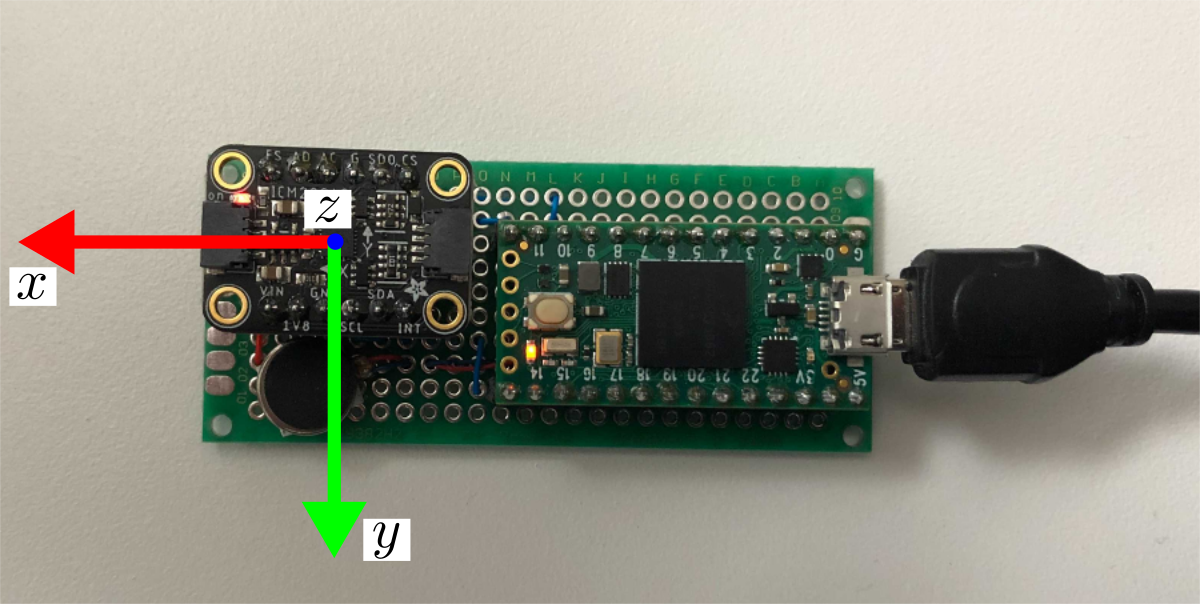Supporting software to stream IMU (Adafruit ICM-20948) connected to Teensy 4.0 via SPI onto desktop computer via serial. Serial IO is handled in C++ and exposed to Python with pybind11.
This repo provides the teensytools Python package to allow easy access to the hardware from Python. The Python package includes the C++ serial driver for quickly communicating with the teensy. The C++ is transparent to the user via pybind11. This Python package can be installed using the pre-built binaries via pip or by building from source yourself.
Once teensytools is installed on your machine, you will be able to quickly plot data (see Examples below) like:
Note: Only Python 3 is supported. When a command uses python or pip, you may need to replace with python3 or pip3 depending on your system. You can always use python --version or pip --version to check which version is being used.
For the following systems, the teensyimu Python package can be easily installed using pip and without requiring building from source: ubuntu-18.04, ubuntu20.04, macos-catalina (potentially macos-bigsur), windows-10. To do this, we will leverage the pre-built binaries posted on the releases page.
Under the desired release version, expand the Assets list. Then, right-click the appropriate *.tar.gz link and copy the link address. You can simply direct pip to install the package at the URL. For example, using release version 0.1 on macos you would run:
$ pip install https://github.com/plusk01/teensyimu/releases/download/0.1/teensyimu-py3-macos-0.1.tar.gzOnce installed, the installation can be verified with python -m teensyimu.plotimu. If the device is not plugged in, you should see a message (Could not find Teensy!) and the script should quit gracefully. If the device is plugged in data should apppear in the terminal and a plot should open.
Note: If the latest version is desired (check here) and there is not a release matching this version, then this package needs to be built from source (see below, e.g., Linux / MacOS, and then follow "Installing Python Package from Source").
Linux / MacOS
After cloning this project onto your computer:
- Build C++ driver with Python bindings (requires Boost):
mkdir build
cd build
cmake ..
makeOnce the package builds successfully, you can install the teensyimu Python package as described below.
Windows
Compilation of this package has been tested on a Windows 10 machine. The environment was setup as follows. Explicit versions used are listed, but these steps are expected to work with reasonably recent versions of these tools.
- Install git bash (2.30.1)
- Install CMake (3.19.5)
- Install Python (3.9.1)
- Install Visual Studio Community or Professional (Pro 2019, v16.8.5 with MSVC 14.28.29333)
- Install Boost (1.75.0,
boost_1_75_0-msvc-14.2-64.exe)
Once the development environment is setup, use git bash (or cmd) to run the following commands
$ git clone https://github.com/plusk01/teensyimu # clone this repo in your preferred directory
$ cd teensyimu
$ mkdir build
$ cd build
$ cmake -DBUILD_SHARED_LIBS=OFF ..
$ cmake --build . --target ALL_BUILD --config Release # or open in VS: start teensyimu.sln
$ cmake --build . --target pypkg --config Release # to tar python pkgOnce the package builds successfully, you can install the teensyimu Python package as described below.
Installing Python Package from Source
Install the built-from-source Python package with pip:
cd build
make pip-installFlash Teensy with firmware/firmware.ino sketch.
See an IMU data plot in real-time with python -m teensyimu.plotimu. Alternatively, you can see the frequency spectrum with python -m teensyimu.plotfreq
To create new or change existing messages, changes need to be made in teensyimu_serial.h and in serial_driver.cpp. For these changes to appear in Python, py_teensyimu.cpp also needs to be changed. For an example of necessary changes, see this commit where two new messages (IMU_NoMag and IMU_3DOF) were added.
If messages are changed, this project must be built from source.

